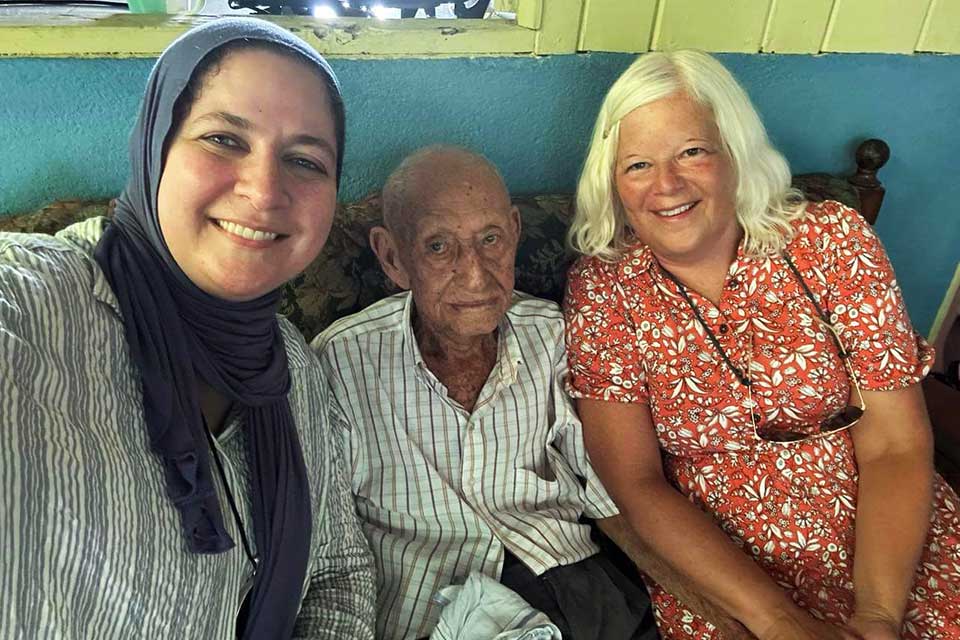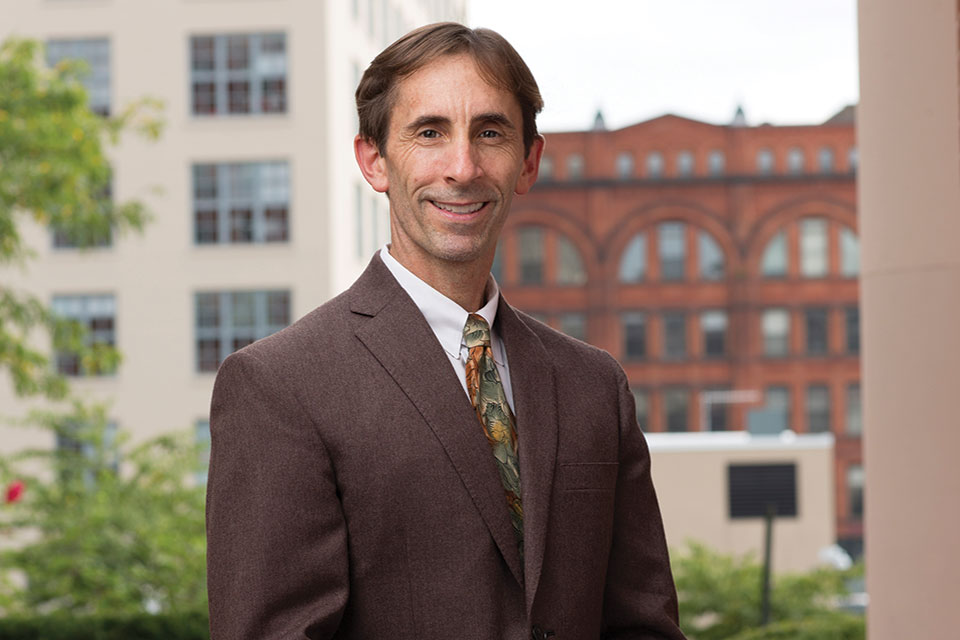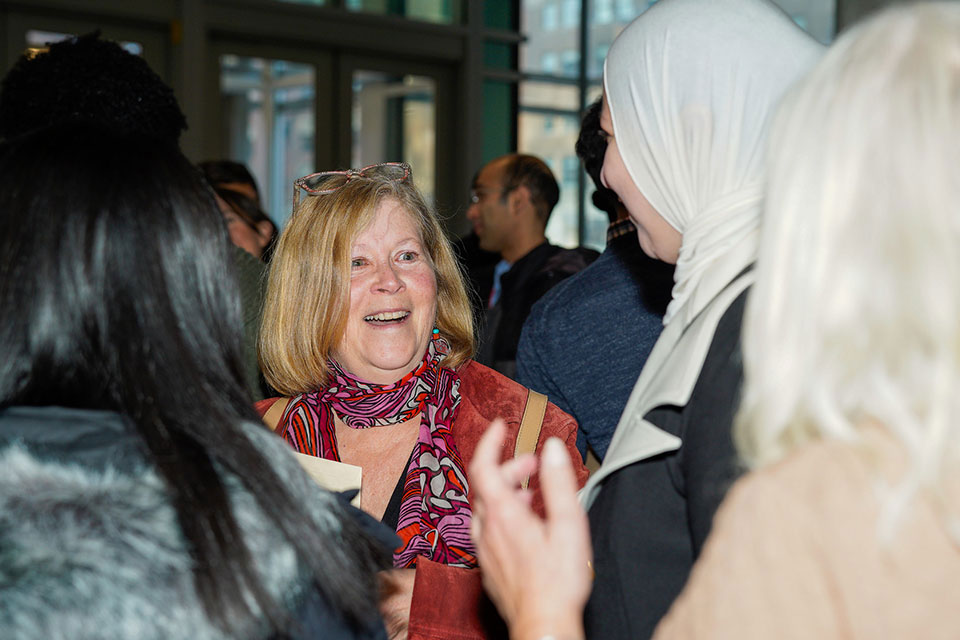Global Efforts to Revolutionize Care of Older Adults: The Peter Lamy Center’s Expanding Reach
For more than 40 years, the University of Maryland School of Pharmacy’s Peter Lamy Center on Drug Therapy and Aging has been at the cutting edge of enhancing care of older adults. Now, this pioneering center is taking its expertise to a global stage.

By Robyn Fieser, published in The Capsule, Winter 2025
January 7, 2025
As the global population ages, health care systems are increasingly focused on the unique challenges and opportunities this shift presents. For more than 40 years, the University of Maryland School of Pharmacy’s Peter Lamy Center on Drug Therapy and Aging has been at the cutting edge of enhancing care of older adults. Now, this pioneering center is taking its expertise to a global stage.
From Finland to Japan to Costa Rica, the Lamy Center is forging international collaborations with organizations, academic institutions, health care systems, and governments. These partnerships are about sharing knowledge, driving joint research, and establishing best practices in geriatric pharmacotherapy to improve medication management and outcomes for older adults worldwide.
Nicole Brandt, PharmD ’97, MBA, BCGP, FASCP, executive director of the Lamy Center and a professor in the Department of Practice, Sciences, and Health Outcomes Research (P-SHOR), captures the essence of this global mission: “Our vision is to improve the lives of older adults by optimizing medication safety and use. We are staying true to that vision and mission, thinking about how our work can be amplified by helping others. We are partnering with organizations around the world that have movements that matter with older adults.”
In the global context of aging, prioritizing “What Matters” in supporting older adults means addressing their individual health goals and preferences to provide personalized care based on their unique experiences. This approach is part of the 4Ms Framework — What Matters, Medication, Mentation, and Mobility — developed by the Institute for Healthcare Improvement in collaboration with The John A. Hartford Foundation as part of the Age-Friendly Health Systems model. The Lamy Center uses the framework to improve the care of older adults.
When it comes to medication, the focus is on ensuring safe use, especially for older adults who might be more susceptible to side effects. The aim is to ensure that medications are effective and customized to the individual’s needs, while avoiding those that could be harmful or interact negatively with other treatments.
“If we focus on the 4Ms, we can effectively care for our older adults,” says Daniel Mansour, PharmD ’06, MS ’24, AGSF, BCGP, FASCP, director of education and interprofessional clinical training at the Lamy Center.
More Years, More Heath Challenges
This approach is increasingly critical as the global population ages rapidly. The World Health Organization (WHO) predicts that by 2030, 1.4 billion people — 1 in 6 — will be 60 or older. By 2050, this number will rise to 2.1 billion, with the 80-plus population tripling to 426 million. The aging trend is particularly pronounced in low- and middle-income countries.
As people live longer, the prevalence of chronic conditions increases the demand for health care services and medications. Addressing these needs requires a larger, better-trained workforce and the creation of age-friendly environments, especially in underserved areas. This involves interdisciplinary efforts across policy, health care, and caregiver support
The University of Maryland, Baltimore (UMB) is one of two Maryland universities to receive designation as an Age-Friendly University, indicating that it actively works to create educational environments that are inclusive and supportive of older adults.
Recognized as UMB’s hub for age-related research, education, and practice, the Lamy Center collaborated with other departments and organizations to align UMB’s goals with the Age-Friendly University Global Network’s standards. This includes prioritizing research on aging, enhancing access to education for older adults, and supporting intergenerational learning.
The Lamy Center plays a vital role in educating students and faculty from a wide range of disciplines on how to deliver comprehensive, person-centered care for older adults. Through its interdisciplinary Aging in Place program, the center brings together students, faculty, and professionals from fields such as social work, physical therapy, medicine, pharmacy, nursing, dentistry, audiology, dental hygiene, and more.
Through real-life case studies, participants learn with, from, and about each other in collaborative environments. In practical settings such as affordable housing communities for older adults, they work side by side, discussing individual needs, delivering health education talks, and performing essential health assessments such as blood pressure checks and screenings for high-risk medications. This collaborative effort is deeply rooted in building connections with the older adult community, allowing participants to gain hands-on experience in providing holistic, elder-focused care.
“We have trained hundreds of the future workforce; learners come to us from almost all health care disciplines,” Mansour says. In 2020, two students from the University of Helsinki in Finland participated virtually in the Aging in Place program. Today, the School of Pharmacy and the University of Helsinki have a formalized relationship and are working together to create an enhanced collaborative online international learning experience. The course includes 15 modules on geriatric care. Students from both countries will take one module each week and work in teams to discuss cases, brainstorm how to build bridges in the community, and develop presentations.
Power of Partnership
The relationship with Finland has evolved over the years. The connection began in 2005, when Alan Lyles, ScD, MPH, BSP ’80, a School of Pharmacy alumnus and professor in the University of Baltimore’s School of Public and International Affairs and School of Health and Human Services, traveled to Finland to lecture on pharmaceutical safety and outcomes research. What started as a single lecture blossomed into a deep and lasting partnership that has helped reshape Finland’s health care system.
Over the years, Lyles, an expert in pharmaceutical economics and health policy, has been awarded three prestigious Fulbright Specialist grants, advising leaders in Finland on health care and social services reform. Lyles has served as a mentor and collaborator with many, including Brandt who was present when his work was recognized in May 2023 by the University of Helsinki. He was awarded an honorary doctorate for his contributions to the country’s health care landscape.
In recent years, Finland has expanded the pharmacist’s role in patient services, especially in geriatric care. To foster greater interprofessional collaboration in this area, Lyles encouraged Brandt to travel to Finland as a Fulbright Program Specialist in 2023-2024. Brandt’s mission was to explore new strategies that enhance collaboration between health care professionals and raise awareness about pharmacists’ potential to improve medication safety in older adults. This fellowship was not Brandt’s first interaction with Finland. She has collaborated with Finnish scholars and has a personal connection to the country through her husband’s family. The experience reinforced for her the importance of collaboration in shaping the future.
This collaborative approach proved invaluable for Brandt in another global project, this time in Doha, Qatar, where, in consultation with the Institute for Healthcare Improvement, she contributed to developing a road map for age-friendly programs at Hamad Medical Corp., the principal public health care provider in Qatar. Brandt leveraged her expertise to help the Qatar team implement the 4Ms Framework. This initiative united pharmacists, physical therapists, case managers, and other professionals to create an interdisciplinary health team dedicated to delivering comprehensive, patient-centered care to older adults.
Mostafa ElAwady, PharmD, BCPS, SIDP, a clinical pharmacist at Hamad Medical Corp., reflects on the impact of the initiative. “We had never before considered how medications might affect what matters to the patient and their family,” he says. “I’m proud that we’ve broadened our perspective. Now, we’re screening in a more patient-centered way and becoming more specialized.”
ElAwady notes that patients and their families are responding positively to this shift. “We’re receiving a lot of positive feedback,” he shares. “Patients now better understand how their medications might cause delirium or affect their mobility. This understanding is crucial, as it encourages more interaction and engagement from patients, which is very important.”
Brandt and ElAwady recently published “Age-Friendly Health Systems 4Ms: Implementing Medication Management in Hamad Medical Corporation, Qatar” in the Journal of Gerontological Nursing. The article emphasizes that medication management is a cornerstone of the model, requiring interdisciplinary team input during screening and care to ensure the proper prescribing and use of medications for older adults.
Seeing the World
As part of UMB, the School of Pharmacy benefits from the University’s focus on facilitating trips for students and faculty that help them explore how other countries address elder care and policies. These experiences offer valuable insights and opportunities to learn from global practices, enhancing the University’s approach to age-friendly health systems.
One exciting journey takes students to Japan, one of the oldest societies in the world, where people routinely live to 100 years of age or more, thanks to a culture that prioritizes healthy living.
In UMB’s Global Health Aging: Gerontology in Japan course, students from diverse disciplines dive into the cultural norms and social frameworks that influence aging, life transitions, and intergenerational connections in that country. The course culminates in a two-week trip to Kanagawa Prefecture, Japan, where students tour housing complexes and hospitals, engage with officials from the Kanagawa government and representatives of the WHO Asia Pacific region, and visit research centers and academic institutions.
“How are you going to keep yourself engaged? That is something that Japan has done really well. They have a place for everybody, it doesn’t matter if you’re 90 or 40 years old. So that’s one of the things students learn — it’s not just about long-term care for older people, it’s also about how to create spaces for an older workforce,” says Diane Martin, PhD, MSL, MA, director of UMB’s Geriatrics and Gerontology Education and Research (GGEAR) Program and co-lead for UMB’s Age-Friendly University efforts.
Through the Alicia and Yaya Initiative in Global Aging Research — a collaboration between UMB and the University of Costa Rica — Danya Mazen Qato, PhD, PharmD, MPH, associate professor of P-SHOR at the School of Pharmacy, participated in July 2023 in an eight-day faculty research delegation in Costa Rica, where she met centenarians and explored what contributes to living long and fulfilling lives. Her travels to Costa Rica — Qato also participated as a fellow in the January 2023 inaugural UMB/Costa Rica Faculty Development Institute — were driven by a desire to understand the unique health care challenges faced by a country with universal health care and how these challenges compare to those in the United States.
In Costa Rica, Qato met her first centenarian and talked about what has truly mattered in their lives. The resounding answer was family and community. “When we think about and study health care, we often focus on what happens in the hospital or during a clinical visit,” Qato explains. “This experience reaffirmed how crucial the ecosystem outside the hospital, especially family and community relationships, is not just for longevity, but for quality of life. Every centenarian we spoke to emphasized the significance of their family and active community involvement in enhancing their mental, spiritual, and physical well-being.”
As the Lamy Center prepares to launch its international online learning initiative, the focus remains on building a strong community. The goal is to foster connections among health care providers, encourage international collaboration, and create lasting partnerships. These connections are ultimately aimed at serving the global aging population, helping them thrive in ways that honor their immense value.
Mansour and Brandt echo this sentiment about passion. “What drives us is a passion, not the job nor career — it’s a calling. Our commitment to serving older adults brings about fulfillment, joy, and remarkable results in their lives and ours,” Mansour says.



